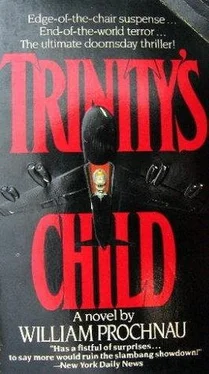Harpoon stopped and turned to look at the successor.
“You find fault in that, Harpoon?” the man asked. “The caged animals, as the colonel put it, attacked us first, did they not?”
“They have a system of their own, sir.”
“And?” The successor sounded now as if he were humoring Harpoon, but the admiral decided to ignore it.
“For various reasons,” he continued, “the structure of their system is somewhat different. They placed the bulk of their nuclear weaponry in land-based missiles. Many of those silos remain unused and undestroyed. The Russians are extremely defensive in nature. They spent billions on elaborate defenses against our bombers. This drained off resources for submarines. We abandoned serious air defenses decades ago, spending the money instead on a submarine fleet vastly superior to theirs. Frankly, we thought they were suckers. If the game was a bluff, it was better to bluff with offense than defense. The bombers clearly were the weakest part of our system.”
The colonel caught a downturn in Harpoon’s words and interrupted again. “The Soviets,” he said, with a slight touch of condescension, “have been invaded by Tatars, French, Germans…” He turned aggressively toward Harpoon. “You are quite right that they are defensive in nature. We quite wisely exploited that tendency.” He paused for emphasis. “And what you call the weakest part of our nuclear system may prove to be the Soviets’ Achilles’ heel.”
Harpoon angrily jabbed his pointer again, knowing what the colonel was approaching. “Colonel,” he growled, “will you please keep your goddamn mouth shut till I’m finished?”
“I’d like to hear what he has to say,” the successor said quietly.
“He can wait. He’ll make quite certain you hear him.”
“Unless you harpoon him first, admiral,” the successor said, gesturing at the pointer.
“The temptation is growing.”
“I imagine.”
The colonel smugly sank deeper into his chair. Harpoon continued.
“The difference in forces somewhat dictates the timing. It means the Soviet second strike, by their bombers, will take our cities first. Our third strike, by the submarines, will take theirs shortly afterward.”
“Malarkey!” The successor started to rise out of his chair. “Even I know the Soviet bombers are so old we could knock ’em down with a peashooter.”
“Admiral,” the colonel blustered in again, “those Model T crates are so vulnerable the Minnesota Air National Guard could do the job.”
Harpoon finally exploded. “If you’re so damned smart, colonel, go to the yellow phone and order ’em into the air. I can’t even get through to Minneapolis. Every transistor, every piece of copper communications wire in Minnesota is burned out. We got 150 Model T’s coming at us, most of them so old they still have propellers. We can’t stop half of ’em and you damned well know it. Every one of them is carrying more than a megaton of thermonuclear weapons. In a few hours they’re going to be roaming at will across this country. And they’re going to pick off their targets one by goddamned one. New York. Philadelphia. Denver. Minneapolis. Till they get down to Waterloo, Iowa. Waterloo, colonel. You remember Waterloo?”
“And our bombers will do the same thing,” the successor said. It was not a question.
“No,” Harpoon answered, trying to calm himself. “Their bombers were in the air when the attack began. Most of our alert force was caught on the ground. We have about twenty bombers flying.”
“Twenty!”
“Twenty can do a lot of damage, but—”
“But what! What other juicy news do you have for me?”
“At this moment, some of our bombers are under attack by fighter interceptors.”
“The Soviets can attack our bombers and we can’t attack theirs?”
“Sir, they had the element of surprise. They spent then-money on bomber defenses, as we wanted them to. The B-52’s are a suicide squad.”
“So how much of our vaunted second strike will get through?”
“Maybe a dozen will get past the interceptors. The survivors then have to thread their way through the best bomber defense ever devised. A bit chewed up, but the best. We never expected them to get through. We wanted to mousetrap the Soviets into wasting money on defense for a war with no defenses.” He paused and cast a rueful look at the colonel. “We were successful,” he added.
“How many?”
“A couple. A half-dozen if we’re lucky.”
“And we sit idly by while the commies nuke their way through America.”
“Sir, for God’s sake, we’re hardly sitting idly by. In the end, it will equal out. Our submarines will do infinitely more damage. There will be nothing of value left of the Soviet Union, just as there will be nothing of value left of the United States. And it won’t stop there. The weapons in Europe will go. The remaining Soviet ICBM’s. That’s the system we built. It really doesn’t make much difference, does it? The Russians simply get the first crack…” The admiral’s words trailed off.
“Harpoon, you will roast in hell.”
“Probably. But not for telling you the truth, sir.”
The successor stared at Harpoon, his gaze almost hateful. “How many warheads we got in our subs?”
“About seven thousand, sir.”
“Launch ’em,” the man said simply.
Harpoon stared at him silently.
“SIOP be damned!” the successor thundered. “This is the most cockamamie, defeatist, godless thing I’ve ever heard. Give the bastards the works. Now!”
A wisp of an unhappy smile touched Harpoon’s craggy face. He put his pointer down quietly. “I understand your frustration, sir,” the admiral said. “I truly understand your frustration. It is a sick system. Even sicker than I’ve described.”
The successor’s stare turned raw. “You’re patronizing me again, Harpoon. I’m your Commander-in-Chief. I’ve given you an order.”
“An impossible order.”
“You refuse a direct order?”
“I can’t order the submarines to do anything. Nor can you. We’re rebuilding our communications slowly. But even with pre-war communications we couldn’t talk to them. They are invulnerable, the perfect final bluff, because no one can find them. Not even us. They received their orders hours ago as the first missiles landed. Those orders were to run silent and deep, away from detection or communications, for fifteen hours. Then the main part of the fleet will come back near the surface to listen. If they hear nothing, they will fire. That’s the system. The Soviets know it as well as we do. They know that if their bombers strike, if they send off more ICBM’s, they are dead. Because there will be no one and no reason to talk to the submarines.”
The successor’s eyes dropped slowly. For a moment he seemed lost in thought. Then his eyes rose again, avoiding Harpoon, and moved around the conference table at the silent Air Force officers. The successor whipped his gaze back at Harpoon. “You are telling me,” he asked, his words coming in a hauntingly detached cadence, “that the fate of our nation… rests in the hands… of a dead computer?”
“The fate of the world,” whispered the general whom Harpoon had forced to be both optimistic and pessimistic.
Harpoon sighed. “That isn’t quite true,” he said slowly. “First it is important to understand—and, in our dependence on machines, we often forget it—that SIOP is… was… no more than the accumulation of the wisdom and foolishness of several generations of our brightest men. Almost all of them well-meaning. Almost all of them scared.”
“Do you believe I am well-meaning?” the successor asked.
“I believe so, sir.”
“Do you believe I am scared?”
Читать дальше












